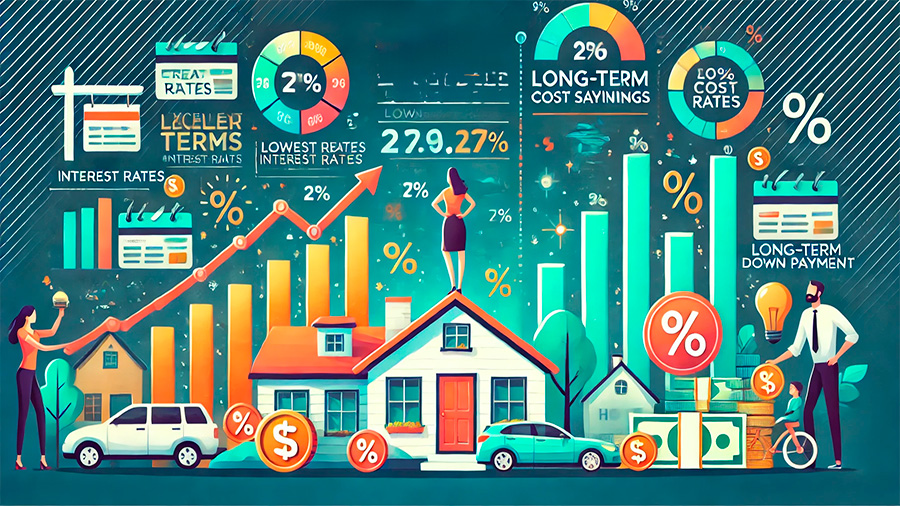Your credit history is one of the most important factors that lenders consider when you apply for a mortgage. It reflects your financial behavior over time, showing how well you’ve managed past debts, made payments, and handled credit accounts. A strong credit history can significantly improve your chances of getting approved for a mortgage with favorable terms, while a poor credit history may lead to higher interest rates or even denial of your mortgage application.
When buying a home, lenders want to ensure that you are a reliable borrower who can meet the long-term commitment of a mortgage. Your credit history provides a snapshot of your financial responsibility, helping lenders assess the risk of lending to you. A good credit history not only helps you secure approval but also allows you to qualify for lower interest rates, saving you money over the life of the loan.
The Role of Credit Scores in Mortgage Approval
Your credit score, which is a key component of your credit history, plays a central role in determining your ability to buy a home. Lenders use your credit score to evaluate your creditworthiness and decide whether to approve your mortgage application. A higher credit score indicates that you’ve managed credit responsibly, making you a lower-risk borrower in the eyes of lenders.
Credit scores generally range from 300 to 850, with higher scores offering better chances of mortgage approval and lower interest rates. Most conventional mortgage lenders require a minimum credit score of around 620 for approval, though this varies depending on the type of loan and the lender’s criteria. Borrowers with scores above 700 are more likely to qualify for the best loan terms, including lower interest rates and reduced down payment requirements.
On the other hand, a low credit score can make it difficult to secure a mortgage, and if you are approved, the interest rates will likely be higher, increasing the cost of homeownership over time. Improving your credit score before applying for a mortgage is essential to ensuring that you qualify for the best possible terms.

How Credit History Impacts Mortgage Terms
Beyond simply qualifying for a mortgage, your credit history directly influences the terms of the loan, including the interest rate, down payment requirements, and loan amount. A strong credit history demonstrates to lenders that you’re a responsible borrower, which can lead to more favorable terms.
For example, borrowers with excellent credit scores often receive lower interest rates, which means lower monthly payments and reduced overall costs. Even a small reduction in interest rates can save you thousands of dollars over the life of a 30-year mortgage. In contrast, borrowers with poor credit histories may face higher interest rates, which increase the total cost of the loan and monthly payments.
Additionally, your credit history can affect the size of the loan you’re approved for. Lenders use your credit history to determine how much risk they are willing to take, and a strong history may allow you to borrow more money. On the other hand, if your credit history shows missed payments or high levels of debt, the lender may limit the amount you can borrow or require a larger down payment to offset the risk.
Improving Your Credit to Buy a Home
If your credit history isn’t as strong as it could be, there are steps you can take to improve it before applying for a mortgage. The first step is to review your credit report from all three major credit bureaus—Equifax, Experian, and TransUnion. Make sure there are no errors or inaccuracies that could be dragging down your credit score. If you find any mistakes, dispute them with the credit bureau to have them corrected.
Next, focus on reducing any outstanding debt, especially high-interest credit card balances. Paying down debt improves your credit utilization ratio, which is a key factor in determining your credit score. Aim to keep your credit utilization below 30% of your total available credit to maintain a healthy score.
Another important factor is your payment history. Lenders place significant weight on whether you’ve made on-time payments in the past. If you have a history of missed payments, start building a record of timely payments to improve your creditworthiness. Setting up automatic payments or reminders can help ensure that you don’t miss due dates.
The Long-Term Benefits of a Strong Credit History
Building and maintaining a strong credit history not only improves your ability to buy a home but also sets you up for long-term financial success. A good credit history gives you access to better loan terms, lower interest rates, and more financial opportunities. By focusing on improving your credit before applying for a mortgage, you can save money over the life of your loan and make homeownership more affordable.
In addition, a strong credit history can help you in other areas of life, such as securing lower rates on auto loans, qualifying for credit cards with better rewards, and even getting approved for rental housing. Financial institutions and landlords often review credit reports to assess whether potential borrowers or tenants are financially responsible. Maintaining a healthy credit history allows you to navigate these financial decisions with confidence and ease.
Conclusion
Your credit history plays a critical role in your ability to buy a home. Lenders use your credit score and credit report to determine whether you’re a reliable borrower and to set the terms of your mortgage. By improving your credit before applying for a loan, you can increase your chances of getting approved and securing the best possible terms. Regularly reviewing your credit report, paying down debt, and making timely payments are all essential steps toward building a credit history that supports your homebuying goals.



